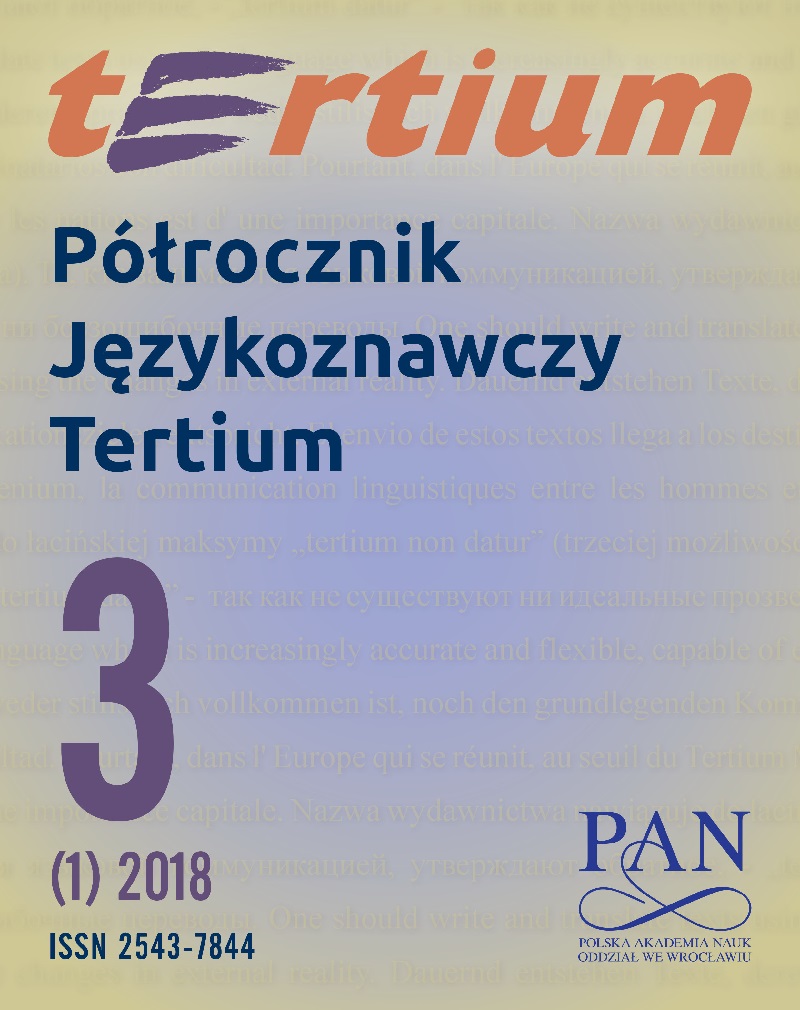„Chleba naszego potrzebnego”?
“Give Us Our Needed Bread?”
Discussion on the New Swedish Translation of “Our Father”
Author(s): Weronika PluteckaSubject(s): Christian Theology and Religion, Anthropology, Philosophy, Language and Literature Studies, Literary Texts, Customs / Folklore, Applied Linguistics, Theology and Religion, Religion and science , Pragmatics, Historical Linguistics, Comparative Linguistics, Sociolinguistics, Descriptive linguistics, Philosophy of Language, Cultural Anthropology / Ethnology, Social psychology and group interaction, Organizational Psychology, Sociology of Culture, Biblical studies, Translation Studies
Published by: Krakowskie Towarzystwo Popularyzowania Wiedzy o Komunikacji Językowej Tertium
Keywords: Our Father; Sweden; Bible, translation; ecumenism
Summary/Abstract: Ojcze nasz to najważniejsza modlitwa chrześcijan. Jako starożytny tekst biblijny od wieków poddawana jest badaniom oraz tłumaczona na nowo wraz z rozwojem języków docelowych. Ze względu na powszechność tej modlitwy takie zmiany nie zachodzą niepostrzeżenie i budzą sprzeciw członków różnych wspólnot wyznaniowych. Niniejszy artykuł przedstawia specyfikę przekładu tekstów liturgicznych na podstawie analizy tłumaczeń na język szwedzki. Pokazana zostaje historia szwedzkiego tłumaczenia modlitwy Ojcze nasz, aż do opublikowania kontrowersyjnej wersji ekumenicznej w 1996 r. Przeanalizowane zostają wybrane różnice w „starym” i „nowym” tłumaczeniu oraz najważniejsze postulaty w debacie nad przyjęciem wersji ekumenicznej. Artykuł zamyka przytoczenie obecnego stanowiska kościoła katolickiego i protestanckiego wobec nowej wersji oraz dyskusja nad nowoczesnością i tradycją we współczesnych tłumaczeniach Modlitwy Pańskiej. Studium pozwala zobaczyć, w jaki sposób zmiany w obszarze przekładu mogą spowodować poruszenie społeczne i konflikt, jeśli nie są dostosowane do aktualnych przekonań reprezentantów danej kultury. // "Our Father" is the most essential Christian prayer. Being an ancient biblical text it has been translated and interpreted through the ages as target languages were developing. Due to the universality of this prayer, such changes do not occur unnoticed and raise opposition of members of various religious communities. This article presents the specifics of the translation of liturgical texts based on the analysis of translations into Swedish. The history of the Swedish translation of the "Our Father" prayer is covered up to the publication of the controversial ecumenic version in 1996. Selected differences in the "old" and "new" translations and the most important postulates in the debate on the adoption of the ecumenical version are analyzed. The article ends with a description of the current position of the Catholic and Protestant Church regarding the new version and a discussion on modernity and tradition in translations of the Lord's Prayer. The study shows how changes in the area of translation can cause social uproar and conflict, if they are not adapted to the current convictions of representatives of a given culture.
Journal: Półrocznik Językoznawczy Tertium
- Issue Year: 3/2018
- Issue No: 1
- Page Range: 100-112
- Page Count: 13
- Language: Polish

